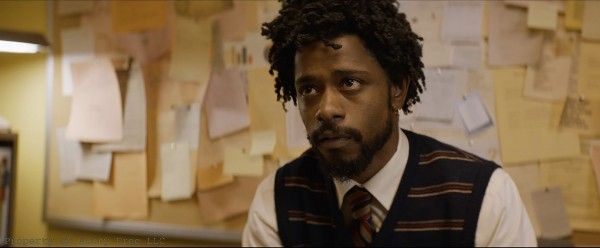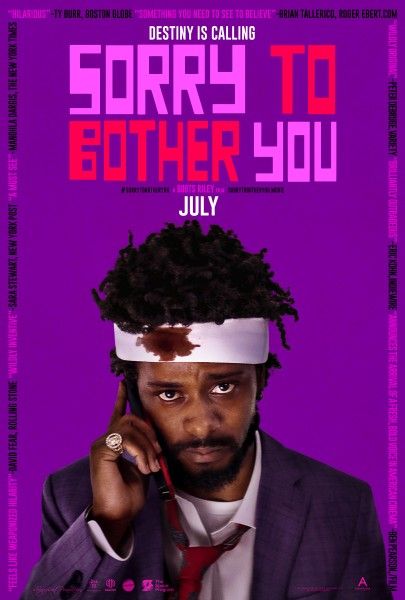With his debut feature Sorry to Bother You, writer-director Boots Riley shows he’s a filmmaker with a lot of potential and a lot on his mind. It’s a movie of staggering ambition, angling to be a modern-day version of Putney Swope as it tackles race, assimilation, labor, capitalism, but also expands to include the media, art, entertainment, and more. It’s a lot, and that’s before you even get to the absurdist reality where the movie dwells. There are aspects of Sorry to Bother You that work extraordinary well, but overall, the film gets crushed under the weight of trying to do so much that sometimes it can feel sluggish as it tries to make an impact.
Cassius Greene (Lakeith Stanfield) has landed a job at a telemarketing company, and he desperately needs the money as he lives out of his uncle’s garage and drives a terrible car. Meanwhile, his girlfriend Detroit (Tessa Thompson) is an artist who also spends her time as an activist for the movement Left Eye, which is working against WorryFree, an institutionalized slavery company that “offers” lifetime employment as long as its workers agree to sign over their entire lives in exchange for a tiny bed and three meals a day. As Cassius’ friends at the telemarketing firm start to organize a union, he breaks away as a “Power Caller” through the power of his “white voice” (David Cross). He must decide if he’ll stand with Detroit and his friends or accept the riches offered by the wealthy and powerful WorryFree CEO Steve Lift (Armie Hammer).
Sorry to Bother You is peppered with clever observations that Riley employs through a deceptively simple story. On a plot level, Sorry to Bother You is pretty straightforward—Cassius is selling out the people close to him because corporate America is offering him riches even though he’ll have lose his sense of self—but it’s like a Christmas tree where all the ornaments are as weird as Detroit’s earrings, which include people in electric chairs. And yet despite the straightforward plot, Sorry to Bother You feels like it’s taking on more than it can handle as it wants to still ground the relationships—especially between Cassius and Detroit—while also existing in a reality where the most popular show on TV is a old-style “game show” where people volunteer to get beat up.
This kind of absurd reality is a difficult balancing act. The movie is consistently outlandish, and I won’t spoil how far it goes (there’s a reveal in the third act that’s completely bonkers, but the movie, to its credit, has prepared you for it in terms of weirdness and thematic relevance), but Riley always keeps us on our toes. The fearlessness on display is admirable, and I’d rather see a filmmaker swing and miss at big ideas rather than meekly go for the status quo. Nevertheless, there are elements that we’re asked to believe not because the satire is dead on, but because the plot requires it. For example, a YouTube video of Cassius getting hit in the head with a can of soda is meant to exemplify the power of random things going viral, but it feels done for the convenience of the story rather than an incisive look at what we deem entertaining.
The movie as a whole may not be perfect, but the talent on display is undeniable. Stanfield continues to quietly prove he's one of the best actors of his generation (think of the diversity of roles he's done in five short years and you'll be amazed), completely able to ground both the dramatic and outlandish aspects of the movie. And visually, so much is happening throughout the film, but Riley knows how to perfectly nail sight gags, swing between goofy humor and disturbing horror without missing a beat, and give his movie a palette that's delightfully twisted yet eye-popping.
Perhaps the central question with regards to Sorry to Bother You is how you like your absurdist comedy and satire. If you prefer it done with laser-like focus that hits to the core of a concept, you’ll likely find Sorry to Bother You too scattershot. But if you like big, bold, broad strokes, then you’ll probably appreciate what Riley is attempting here even if he’s not always successful. I prefer the former to the latter, but I still admire how much Riley is trying to do, and while Sorry to Bother You didn’t completely work for me, I can’t wait to see what Riley does for a follow-up.
Rating: C+
[Update: I saw a slightly shorter cut of Sorry to Bother You that will be released into theaters. It's about seven minutes shorter than the cut that was shown at Sundance, and whatever changes were made have helped streamline the narrative and honed the satire. While there are still a few elements that don't completely work, specifically the viral video and the game show, the film feels far more sharp and cohesive. It's definitely an improvement, which is why I've re-rated it.
New Rating: B]




